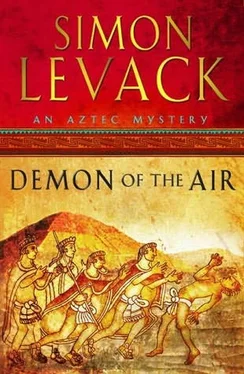Simon Levack - The Demon of the Air
Здесь есть возможность читать онлайн «Simon Levack - The Demon of the Air» весь текст электронной книги совершенно бесплатно (целиком полную версию без сокращений). В некоторых случаях можно слушать аудио, скачать через торрент в формате fb2 и присутствует краткое содержание. Год выпуска: 2012, Издательство: St. Martin, Жанр: Исторический детектив, на английском языке. Описание произведения, (предисловие) а так же отзывы посетителей доступны на портале библиотеки ЛибКат.
- Название:The Demon of the Air
- Автор:
- Издательство:St. Martin
- Жанр:
- Год:2012
- ISBN:нет данных
- Рейтинг книги:4 / 5. Голосов: 1
-
Избранное:Добавить в избранное
- Отзывы:
-
Ваша оценка:
- 80
- 1
- 2
- 3
- 4
- 5
The Demon of the Air: краткое содержание, описание и аннотация
Предлагаем к чтению аннотацию, описание, краткое содержание или предисловие (зависит от того, что написал сам автор книги «The Demon of the Air»). Если вы не нашли необходимую информацию о книге — напишите в комментариях, мы постараемся отыскать её.
The Demon of the Air — читать онлайн бесплатно полную книгу (весь текст) целиком
Ниже представлен текст книги, разбитый по страницам. Система сохранения места последней прочитанной страницы, позволяет с удобством читать онлайн бесплатно книгу «The Demon of the Air», без необходимости каждый раз заново искать на чём Вы остановились. Поставьте закладку, и сможете в любой момент перейти на страницу, на которой закончили чтение.
Интервал:
Закладка:
But what had we found?
I had gone to Coyoacan because my brother had hinted that if I went there I would find some clue to what Lord Feathered in Black had done, in the course of his search for the sorcerers. What I had found was not a sorcerer, but the aftermath of a massacre. It looked as if the victims had been the wife and children of the Bathed Slave who had jumped from the Great Pyramid. The Emperor and my master were both convinced that this man was himself a sorcerer, which explained why Lord Feathered in Black had apparently sent soldiers to his house in search of sorcerers. But killing the man’s family would not have helped my master to find him. There must have been another reason for doing that, but what was it?
Then I thought about the warrior who had left his sandal strap at the house. He had been one of the army’s elite, perhaps either a Shorn One or an Otomi, the kind who would kill to order and never ask why. Who else would the Chief Minister trust to wipe out a whole family quickly, efficiently and without making a fuss?
As soon as that question occurred to me I saw a possible answer, and it was so abhorrent that I had to stop walking for a moment to fight the wave of nausea that threatened to engulf me.
My brother was one of the army’s elite. The strap could easily have been his.
It was my brother who had told me about the warriors going to Coyoacan. I had thought at the time that he knew much more than he was letting on, and that he seemed strangely unsure of himself, as if afraid of saying too much. He would always obey orders and he would carry them out with ruthless dispatch. Yet he was one of the most pious, upright, unbending men I had ever known. What had been done in that village was something he would surely never have stooped to, no matter who ordered it.
“No.” I swallowed a couple of times. “He couldn’t ….”
I walked on slowly, unable to dismiss the appalling thought until I rounded the last corner before my master’s house and had it driven from my mind by the sight of yet another death.
5
Abroad canal ran past the front of the Chief Minister’s house. His Lordship could alight from his canoe and climb straight up the steps to his private apartments if he chose to. It was here that I had been hailed by the steward three days earlier, before that tense interview with my master at the top of the steps. Tonight my intention was just what it had been then: to find my sleeping mat and curl up on it under my cloak.
As soon as I saw the steps I knew this was not going to happen. They were covered in people standing or sitting on them, making them look like the tiers of stone seats surrounding a ball court.
Several pairs of eyes turned on me for a moment, before swiveling back silently toward the canal. As soon as I had climbed a little way up the steps and turned around to get a good look at the water, I saw why.
From behind me, someone said: “His Lordship should be back soon.” There was a general murmur of assent, as if our master’s arrival would help.
Without taking my eyes off the thing floating in the water, I said: “Has anyone sent for a priest?”
With neither my master nor his steward to be found, I found myself taking charge. I had them moor boats across the canal in two places, so as to keep the stretch opposite my master’s house clear of traffic. Then the two priests who had been sent for went out into the middle of the waterway in a canoe with a long pole to fish the dead man out.
“If it’s a drowning, it’s our job,” one of them reminded me. The bodies of the drowned, like their souls, belonged to the rain-god and no one except a priest could handle one.
“Just get the body back here,” I said wearily. “His Lordship willwant to know who he is and what happened to him on Earth, not where his soul is going.”
The priests had no trouble finding the body. It was floating in plain sight. It must have been dumped in the water earlier that evening, perhaps as soon as it had got dark, since otherwise someone would surely have seen it being left. Getting it out proved unexpectedly hard, however. The priests kept catching it with their pole only to find that it would not move. It was only after nearly capsizing their canoe twice that they stripped off their cloaks and started delving into the water to find out why.
Seen from the shore in starlight, the priests’ sooty bodies, long black hair and sticklike limbs made them look like cranes hunting fish on the lake.
Once they had located the rope, it took only a few moments to haul the stone up. It had been tied to the body’s ankle and used as an anchor.
They heaved the body over the side and into the bottom of their boat. They gave it the briefest of examinations before heading back toward the bank. As they scrambled onto dry land their relief was visible in their faces.
“You were right to call us, but it’s not a matter for us, after all,” the younger of the two told me. “He didn’t drown. His throat was cut.”
That explained why he and his colleague were relieved, for it meant they would not have to bury the body. Those who died by water were not cremated but interred, normally in their own courtyards, in a sitting position. Getting them that way, when they were as often as not slimy, bloated, stinking and half eaten by fish, was not a pleasant task.
“Someone fetch a torch,” I commanded, peering over the side of the boat.
The dead man was naked. It was easy to see that he had been thin, almost emaciated. The hair plastered to the side of his head was long. His eyes and mouth were wide open, as if in terror.
The throat had been slashed cleanly across. That may have been the fatal wound, but it was by no means the only one. The body was covered with strange marks, like scars of varying sizes, from tiny punctures to tracts of ugly puckered flesh.
“Not been in the water very long, if you ask me,” the young priest said conversationally, peering over my shoulder. “He’s not swollen up, and the skin’s barely discolored. Doesn’t smell too bad, either.”
I stretched a hand out behind me, without a word, and someone put a pine torch in it. I clambered into the boat. The priests had got the head and torso aboard but left the feet dangling in the water. I pulled them over the side one at a time, looking closely at the rope tied around one of the ankles as I did so.
“Whoever decided to leave a corpse floating opposite my master’s house meant us to find it,” I observed.
“You think it was some sort of message?” It was the young priest again.
“Part of a message, at most,” I replied. “A corpse by itself doesn’t amount to much of a message, does it?”
I looked at the naked body, frowning. After what I had seen that day it was hard to feel anything for this unknown victim except bewilderment. Had he really been killed just to convey a message? And if so, where was the rest of it-the key to whatever threat or warning he represented? I thought of a letter, but there was no obvious place where one could be hidden. My eyes roamed over the torso and limbs, searching for some pattern in the wounds covering them, but there was nothing there. Then I looked at the head again and saw the answer.
“I wonder …” I reached down and parted the dead man’s long, lank hair. It was wet and sticky and clung to my fingers like cobwebs as they delved into it. They brushed against an ear, and the slick skin behind it, and something else-a coarser, less pliant surface than the skin. Of course, I thought, as I drew the little cloth square out and unfolded it, it would not be paper. Paper would have disintegrated in the water.
Sure enough, someone had drawn on the cloth. It had been hastily done and the ink had got a little smudged but the message was clear enough for me to read. It was simple enough: just a name-glyph.
Читать дальшеИнтервал:
Закладка:
Похожие книги на «The Demon of the Air»
Представляем Вашему вниманию похожие книги на «The Demon of the Air» списком для выбора. Мы отобрали схожую по названию и смыслу литературу в надежде предоставить читателям больше вариантов отыскать новые, интересные, ещё непрочитанные произведения.
Обсуждение, отзывы о книге «The Demon of the Air» и просто собственные мнения читателей. Оставьте ваши комментарии, напишите, что Вы думаете о произведении, его смысле или главных героях. Укажите что конкретно понравилось, а что нет, и почему Вы так считаете.












